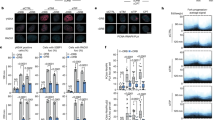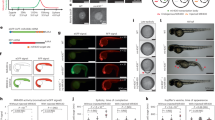Abstract
Cyclin E, a regulatory subunit of cyclin-dependent kinase 2 (Cdk2), is an important regulator of entry into S phase in the mammalian cell cycle. In normal dividing cells, cyclin E accumulates at the G1/S-phase boundary and is degraded as cells progress through S phase1,2. However, in many human tumours cyclin E is overexpressed3 and the levels of protein and kinase activity are often deregulated relative to the cell cycle4,5,6,7. It is not understood how alterations in expression of cyclin E contribute to tumorigenesis. Here we show that constitutive cyclin-E overexpression in both immortalized rat embryo fibroblasts and human breast epithelial cells results in chromosome instability (CIN). In contrast, analogous expression of cyclin D1 or A does not increase the frequency of CIN. Cyclin-E-expressing cells that exhibit CIN have normal centrosome numbers. However, constitutive overexpression of cyclin E impairs S-phase progression, indicating that aberrant regulation of this process may be responsible for the CIN observed. These results indicate that downregulation of cyclin-E/Cdk2 kinase activity following the G1/S-phase transition may be necessary for the maintenance of karyotypic stability.
This is a preview of subscription content, access via your institution
Access options
Subscribe to this journal
Receive 51 print issues and online access
$199.00 per year
only $3.90 per issue
Buy this article
- Purchase on Springer Link
- Instant access to full article PDF
Prices may be subject to local taxes which are calculated during checkout



Similar content being viewed by others
References
Dulic,V., Lees,E. & Reed,S. I. Association of human cyclin E with a periodic G1–S phase protein kinase. Science 257, 1958– 1961 (1992).
Koff,A. et al. Formation and activation of a cyclin E-Cdk2 complex during the G1 phase of the cell cycle. Science 257, 1689–1694 (1992).
Keyomarsi,K. & Herliczek,T. W. The role of cyclin E in cell proliferation, development and cancer. Prog. Cell Cycle Res. 3, 171–191 (1997).
Keyomarsi,K., Conte,D., Toyofuku,W. & Pat Fox,M. Deregulation of cyclin E in breast cancer. Oncogene 11, 941–950 (1995).
Dutta,A., Chandra,R., Leiter,L. M. & Lester,S. Cyclins as markers of tumor proliferation: immunocytochemical studies in breast cancer. Proc. Natl Acad. Sci. USA 92, 5386– 5390 (1995).
Porter,P. L. et al. Expression of cell-cycle regulators p27kip1 and cyclin E, alone and in combination, correlate with survival in young breast cancer patients. Nature Med. 3, 222– 225 (1997).
Nielsen,N. H., Arnerlov,C., Cajander,S. & Landberg,G. Cyclin E expression and proliferation in breast cancer. Anal. Cell Pathol. 17, 177–188 (1998).
Dou, Q-P., Pardee,A. B. & Keyomarsi,K. Cyclin E—a better prognostic marker for breast cancer than cyclin D? Nature Med. 2, 254 (1996).
Erlanson,M. et al. Expression of cyclin E and the cyclin-dependent kinase inhibitor p27 in malignant lymphomas-prognostic implications. Blood 92, 770–777 (1998).
Sakaguchi,T. et al. Prognostic value of cyclin E and p53 expression in gastric carcinoma. Cancer 82, 1238– 1248 (1998).
Bito,T., Ueda,M., Ito,A. & Ichihashi,M. Less expression of cyclin E in cutaneous squamous cell carcinomas that in benign and premalignant keratinocytic lesions. J. Cutan. Pathol. 24, 305–308 (1997).
Bortner,D. M. & Rosenberg,M. P. Induction of mammary gland hyperplasia and carcinomas in transgenic mice expressing human cyclin E. Mol. Cell. Biol. 17, 453–459 (1997).
Hua,X. H., Yan,H. & Newport,J. A role for Cdk2 kinase in negatively regulating DNA replication during S phase of the cell cycle. J. Cell Biol. 137, 183 –192 (1997).
Walter,J., Sun,L. & Newport,J. Regulated chromosomal DNA replication in the absence of a nucleus. Mol. Cell 1, 519–529 ( 1998).
Hinchcliffe,E. H., Li,C., Thompson,E. A., Maller,J. L. & Sluder, G. Requirement of Cdk2-cyclin E activity for repeated centrosome reproduction in Xenopus egg extracts. Science 283, 851–854 (1999).
Lacey,K. R., Jackson,P. K. & Stearns, T. Cyclin-dependent kinase control of centrosome duplication. Proc. Natl Acad. Sci. USA 96, 2817– 2822 (1999).
Gossen,M. & Bujard,H. Tight control of gene expression in mammalian cells by tetracycline-responsive promoters. Proc. Natl Acad. Sci. USA 89, 5547–5551 (1992).
Resnitzky,D., Gossen,M., Bujard,H. & Reed,S. I. Acceleration of the G1/S phase transition by expression of cyclins D1 and E with an inducible system. Mol. Cell. Biol. 14, 1669–1679 (1994).
Won, K-A. & Reed,S. I. Activation of cyclin E/Cdk2 is coupled to site-specific autophosphorylation and ubiquitin-dependent degradation of cyclin E. EMBO J. 15, 4182– 4193 (1996).
Simpson,G., Roe,A. & Lewontin,R. Quantitative Zoology (Harcourt Brace, Burlingame, New York, 1960).
Lengauer,C., Kinzler,K. W. & Vogelstein, B. Genetic instabilities in human cancers. Nature 396, 643–649 ( 1998).
Winey,M. Keeping the centrosome cycle on track. Genome stability. Curr. Biol. 6, 962–964 ( 1996).
Pihan,G. A. et al. Centrosome defects and genetic instability in malignant tumors. Cancer Res. 58, 3974–3985 (1998).
Elble,R. & Tye,B. K. Chromosome loss, hyperrecombination, and cell cycle arrest in a yeast mcm1 mutant. Mol. Biol. Cell 9, 971–980 (1992).
Mumberg,D. et al. Uncoupling of DNA replication and cell cycle progression by human cyclin E. Oncogene 13, 2493– 2497 (1996).
Haas,K. et al. Malignant transformation by cyclin E and Ha-Ras correlates with lower sensitivity towards induction of cell death but requires functional Myc and Cdk4. Oncogene 15, 2615– 2623 (1997).
Resnitzky,D., Hengst,L. & Reed,S. I. Cyclin A-associated kinase activity is rate limiting for entrance into S phase and is negatively regulated in G1 by p27kip1. Mol. Cell. Biol. 15, 4347– 4352 (1995).
Xu,X. et al. Centrosome amplifications and a defective G2–M cell cycle checkpoint induce genetic instability in BRCA1 exon 11 isoform-deficient cells. Mol. Cell 3, 389–395 (1999).
Acknowledgements
We thank T. Tisty for the rat cDNA probes, G. Wahl for help with gene-amplification assays and M. Smeets for assistance with cell-cycle experiments. Recombinant adenoviruses were provided by J. Cogswell and S. Neill (Glaxo Wellcome). This work was supported by a grant from the NCI. C.H.S. is supported by a special fellowship from the LSA.
Author information
Authors and Affiliations
Corresponding author
Rights and permissions
About this article
Cite this article
Spruck, C., Won, KA. & Reed, S. Deregulated cyclin E induces chromosome instability. Nature 401, 297–300 (1999). https://doi.org/10.1038/45836
Received:
Accepted:
Issue Date:
DOI: https://doi.org/10.1038/45836
This article is cited by
-
Ubiquitin-specific protease 28: the decipherment of its dual roles in cancer development
Experimental Hematology & Oncology (2023)
-
NF90 stabilizes cyclin E1 mRNA through phosphorylation of NF90-Ser382 by CDK2
Cell Death Discovery (2020)
-
The diverse roles of SPOP in prostate cancer and kidney cancer
Nature Reviews Urology (2020)
-
p50 mono-ubiquitination and interaction with BARD1 regulates cell cycle progression and maintains genome stability
Nature Communications (2020)
-
Genomic and transcriptomic alterations associated with drug vulnerabilities and prognosis in adenocarcinoma at the gastroesophageal junction
Nature Communications (2020)
Comments
By submitting a comment you agree to abide by our Terms and Community Guidelines. If you find something abusive or that does not comply with our terms or guidelines please flag it as inappropriate.



